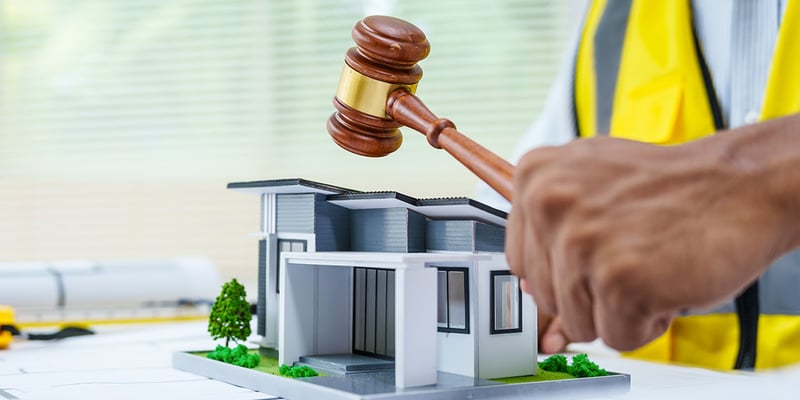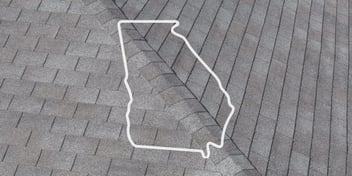- Home »
- Learningcenter »
- Guide avoid roofing liens
The Atlanta Business Owner's Guide to Avoid Roofing Liens

Roofing liens can hurt your business operations in Atlanta. When these claims hit your property, they can freeze your assets, stop your expansion plans, and harm your business relationships before you even know what happened. Just ask about the local restaurant chain that recently had a six-figure lien - it stopped them from opening a new location and scared away their investors.
You can stay away from these problems if you get to know Georgia's lien laws and put some helpful protections in place. Review the records of all your projects. Just remember to check out all your contractors closely before hiring them. Also, remember to file the right notices at the right times. The money that's at stake here is no small matter!
The line between running your business and staying away from expensive legal fights often comes down to having good protection strategies. Look into what other successful Atlanta business owners are doing.
You've probably already done a good job with keeping your records and taking steps ahead of time. Give yourself some credit for that foundation work. But watch out, Georgia has some laws about roofing liens that might surprise you and even change your plans for your project.
Roofing Liens In Georgia
Just so you know, roofing liens in Georgia can give you a real headache as a business owner. Roofing liens let contractors claim payment when they believe you haven't paid for their work.
The lien actually attaches itself to your property as a legal claim. If you don't manage it, you might run into foreclosure or other big problems down the road.
Georgia has laws in place for these liens. You'll find the law in the Georgia Code under section 44-14-361. Contractors need to follow some exact steps to make their lien stick. They have to file their own claim within 90 days after finishing the work - this deadline doesn't bend - and if you miss it, the claim can become worthless.

As a business owner, you should get familiar with the Notice of Commencement. You can also file this document within 15 days after you start your roofing project. You can think of it as an extra safety net for your business. When you file this Notice of Commencement, subcontractors have to send you a Preliminary Notice if they want to keep their right to file a lien later.
Paying attention to the little details can help with roofing liens. Even small mistakes in the paperwork can make a lien useless in court. Usually, contractors need to list all facts, such as exact amounts owed and correct property descriptions. They also need to send the notices to everyone involved before they can move forward with their lien.
You might get completely caught off guard when a lien suddenly shows up on your property. Sometimes, you don't even know that there was a payment dispute with a subcontractor. The main contractor may have actually taken your money. But never paid their workers or suppliers. In these unfortunate situations, you could end up paying twice for the same job.
No doubt, Georgia courts will often enforce liens when contractors follow the laws correctly. They generally like to see liens as a fair way for workers to get paid to upgrade your property. At the same time, they do find that you need protection from unfair claims as well. The system tries to balance these competing needs through its procedures.
Impact Of Liens On Business Operations
A lien on your business can bring it to a standstill. You could be in the same boat as other Atlanta business owners who couldn't refinance their commercial buildings because of these claims. When this happens, getting the money to expand or fix up your place can become almost impossible.
In some cases, liens can freeze your business bank accounts, too. Within just days of missing paychecks, your staff began walking out the door.
Just remember that your standing with suppliers can take a hit as well. Before they give you any credit terms, vendors usually check the Atlanta public records. When they find this lien, you come across as financially shaky. You might lose those net 30 payment terms that you trust for handling your cash flow.

It can become much harder to sell your property with a roofing lien hanging over you. Most buyers will back away as soon as they find out about any liens on the property. They basically don't want to work with someone else's problems. Your sale comes to a halt until you completely clear up the lien situation.
Your business operations can suffer, too. You'll spend your time talking with lawyers instead of focusing on growing your company. When you have to work with paperwork and show up in court, it drains your mental energy. This distraction can cause you to lose customers and miss opportunities to make money.
Be careful, though; legal fees add up fast when you're fighting these lien disputes. You'll need to hire some legal help even if the roofing company's claim seems questionable. Take the case of an Atlanta retail shop owner who spent over $15,000 to fight a $4,000 lien. Her battle in court dragged on for months, and her business struggled throughout the whole time.
Guess what? Your business credit score will probably take a dive when a lien shows up, which makes it harder for you to lease equipment or get protected business credit cards. You'll generally face higher interest rates instead of the better deals you're used to. That's just what tends to happen for businesses with liens in their history.
How To Verify Your Contractor Credentials
Take your time when you're picking a contractor instead of going with the first one you come across. Just make sure they have a business license - any job over $2,500 in Atlanta will need one. Now, ask to see their license documentation before you start signing any paperwork.
You'll want to check your contractor's insurance along with their license. Also, please ask them for copies of their general liability and workers' compensation insurance. Don't just trust what they tell you - actually, give their insurance company a quick call to verify that the policy is active and covers your project.
A contractor's track record tells you plenty about what you can expect from them. Look them up with the Better Business Bureau to see if anyone has filed any complaints. You can also check their standing with the Georgia Secretary of State's office. If you see a few negative reviews or a pattern of complaints, you might want to look for someone else.

Remember that business owners sometimes end up with property liens because they fail to check their contractor's background. Just to give you an example, an Atlanta restaurant owner once hired a roofer without insurance who got injured during the project. The worker then filed a lien against the property to pay for medical costs. The owner could've avoided this whole situation with just a basic insurance verification first. These stories happen more often than you might think.
Find out if your contractor plans to bring in any subcontractors for your project. If they do, ask for a list of these businesses. You'll need to run the same checks on these subcontractors that you did on your main contractor. But those extra workers need credentials, too.
Ask your contractor to give you at least three references from projects like yours. Give these past clients a call and ask them some direct questions about how the work went. Did the contractor finish on schedule? Were there any surprise liens after the job wrapped up? Most people are happy to share their experiences, positive or bad.
Payment and Proper Documentation
Keeping track of your payments helps you a lot when you're working on roofing projects. These records help you avoid lien problems before they can happen. One tip is to save the paperwork related to your roofing payments. Get in the habit of asking for receipts whenever you pay your contractors or suppliers.
Lien waivers also help to protect you during your roofing projects. These papers show that the contractors are giving up their right to put a lien on your property. Make sure to ask for a lien waiver each time you make a payment. You might even want to make these waivers a requirement before you hand over your final payment to them.
You'll also want some evidence of how you paid if any disagreements come up later. Just remember to save the records of your checks, credit card statements, or bank transfers. Actually, it's usually better to pay on the internet as it leaves a better paper trail than cash. For big construction jobs like roofing, you might be better off staying away from cash altogether.

I once worked with an Atlanta restaurant owner who got hit with a surprise $12,000 lien from a materials supplier because their roofing contractor never paid for the shingles used on the job. The owner had thankfully kept their payment records, showing that they had paid the contractor completely. With those papers, they were able to solve what could've turned into an expensive legal dispute.
You can set up a basic spreadsheet to help you keep tabs on your roofing payments. List the date, how much you paid, who got the money from you, and what it was for. Remember to write down when you get the lien waivers for each payment, too. If you set up this system now, it'll help you out if anyone asks questions about the project in the future.
If you break up your payments based on what's finished, it can give you some extra protection for yourself - you won't have to pay too much money before the work is finished. Just to give you an example, you could pay about 30% when the job starts, some more when your roofing materials show up, and then the rest after everything is finished. Why should you pay all at once when you can match your payments to the progress of the work?
File Notices For Lien Protection
Usually, you can stay away from any liens by filing the right paperwork ahead of time. Just make sure that you have your Notice of Commencement (or NOC) ready before any work begins on your property - this form shows everyone who actually owns the property and who's running the project. It also sets a clear start date for your entire project.
Business owners don't know that a NOC actually limits who can file a lien on your property in the future. Without it, pretty much anyone who worked on your building could file a lien against you. But when you file it correctly, only the contractors with direct agreements with you have full lien rights - this one easy step can reduce your risk.
It matters a lot when you file these notices. Just a reminder: try to get your NOC filed before the first worker arrives at your site. If you wait too long, you might not get the protection it offers. Heads up, you'll need to file it at your local county courthouse and post a copy at your job site as well.

When you introduce the Notice of Completion at your project's end, this document officially starts the countdown for any final lien claims against you. In short, after the work is completely done, contractors generally have just 90 days to file a lien.
You could be tempted to skip these steps because they sound like an extra complication. Keep in mind that the filing fees are small compared to what you'd spend to fight an unexpected lien.
Suppliers, subcontractors, and workers may all have some lien rights in Georgia. Anyone who brings any materials or does any work on your project has the right to get paid for what they give you.
When to Talk to a Lawyer
Getting legal help for your roofing liens is money well spent. A skilled lawyer who completely understands Georgia's construction lien laws inside out can save you thousands of dollars down the road. They'll usually catch any contract issues before they can turn into liens on your property.
It's clear that you should try to find a lawyer who deals with construction law in Atlanta. Many of them offer a free first meeting for new clients. You can ask around, as friends or other business owners might know someone reliable. The Georgia Bar Association website is also pretty helpful for finding qualified lawyers near you.
When you meet with them for the first time, make sure to actually take your roofing project papers with you - that means all your contracts, bills, payment records, and any notices you've received. Make sure to also ask them how well they know construction liens and how many cases like yours they've handled recently.

It's a good idea to talk about money with potential lawyers right from the start. Some of them charge by the hour. But others might give you a set price for handling the lien issues. You should ask them to give you a rough idea of what it might cost altogether. It generally helps you avoid higher costs later on if you pay for skilled legal advice now.
If you have your lawyer review the contracts before you sign your name, you can avoid problems down the road. They'll break down the confusing legal terms into normal language for you. They'll show you the parts of the contract that might leave you open to liens and recommend some ways to better protect you and your business.
The fact is, if you ever see a preliminary lien in the mail, that's when it pays off to have a lawyer. These notices won't just disappear if you try to ignore them completely. Your lawyer helps you respond to and talk with the contractors on your behalf. They can help arrange reliable services that settle matters out of court.
Protect The Roof Over Your Head
When you check your contractors' credentials and records, send out notices, and get legal help when needed, you can also protect what you've worked hard to build.
Prevention tends to be more helpful than fixing complications after they happen. Reliable record-keeping might actually feel a bit boring. But those organized files can become your best bet when questions come up later. What steps have you already taken to protect your business from possible liens? Are there any areas where you feel you need better protection?
Your roof protects everything inside: all your equipment, inventory, and the people who make your business run each day. Isn't it worth making sure your roof doesn't turn into a legal problem?

When you need some professional roofing help, it's important to have experts in your corner. We're Colony Roofers, and we work on both residential and commercial roofs with offices in Georgia, Florida, and Texas. You can protect your investment and keep everyone safe by letting us manage your roof repairs.
Give us a call for a free inspection, and we'll take care of your roof the way it deserves. We give sound advice and quality repair and installation services. Reach out to us today!
 Call (678) 365-3138
Call (678) 365-3138



